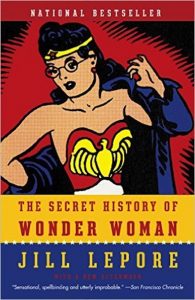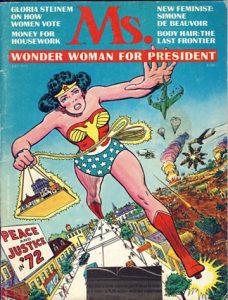 Not until I read the national bestseller, The Secret History of Wonder Woman by Jill Lepore, did I have any inkling that the comic book series was based on first-wave feminist sensibilities. The origins of Wonder Woman began on New York’s Lower East Side within a radical group that included Margaret Sanger and the founding of Planned Parenthood.
Not until I read the national bestseller, The Secret History of Wonder Woman by Jill Lepore, did I have any inkling that the comic book series was based on first-wave feminist sensibilities. The origins of Wonder Woman began on New York’s Lower East Side within a radical group that included Margaret Sanger and the founding of Planned Parenthood.
Lepore writes, “Wonder Woman isn’t only an Amazonian princess with badass boots. She’s the missing link in a chain of events that begins with the woman suffrage campaigns of the 1910s and ends with the troubled place of feminism fully a century later. Feminism made Wonder Woman.”
The actual creator of the iconic super heroine, William Moulton Marston, was a bohemian scholar and offbeat psychologist who invented the lie detector test. During the time between the two 20th-century world wars, when social mores relaxed, Marston experimented with science and learned feminism from the women he loved.
His creation of Wonder Woman became the perfect storm for so many cultural, scientific, and political upheavals that a reasonable argument can be made: Had the Amazonian Princess never been born, America would be a different place. An ardent feminist, Marston developed the concepts and plots for the first comic strips of Wonder Woman with the clear intention of influencing the direction of popular culture.
It’s interesting to me (of course) that Wonder Woman was first released as a comic strip character in 1941, the year I was born. She was an influence on my own girlhood identity, shaped by the comic books that proliferated throughout the ‘40s.
 When Wonder Woman faded from popularity in the ‘50s with the advent of television, I didn’t realize how much she still meant until she reappeared out of the blue on the first issue of Ms. Magazine in 1972. Not knowing her secret history, Wonder Woman was to me the perfect icon for second-wave feminism. Now I understand: that was the point all along.
When Wonder Woman faded from popularity in the ‘50s with the advent of television, I didn’t realize how much she still meant until she reappeared out of the blue on the first issue of Ms. Magazine in 1972. Not knowing her secret history, Wonder Woman was to me the perfect icon for second-wave feminism. Now I understand: that was the point all along.
